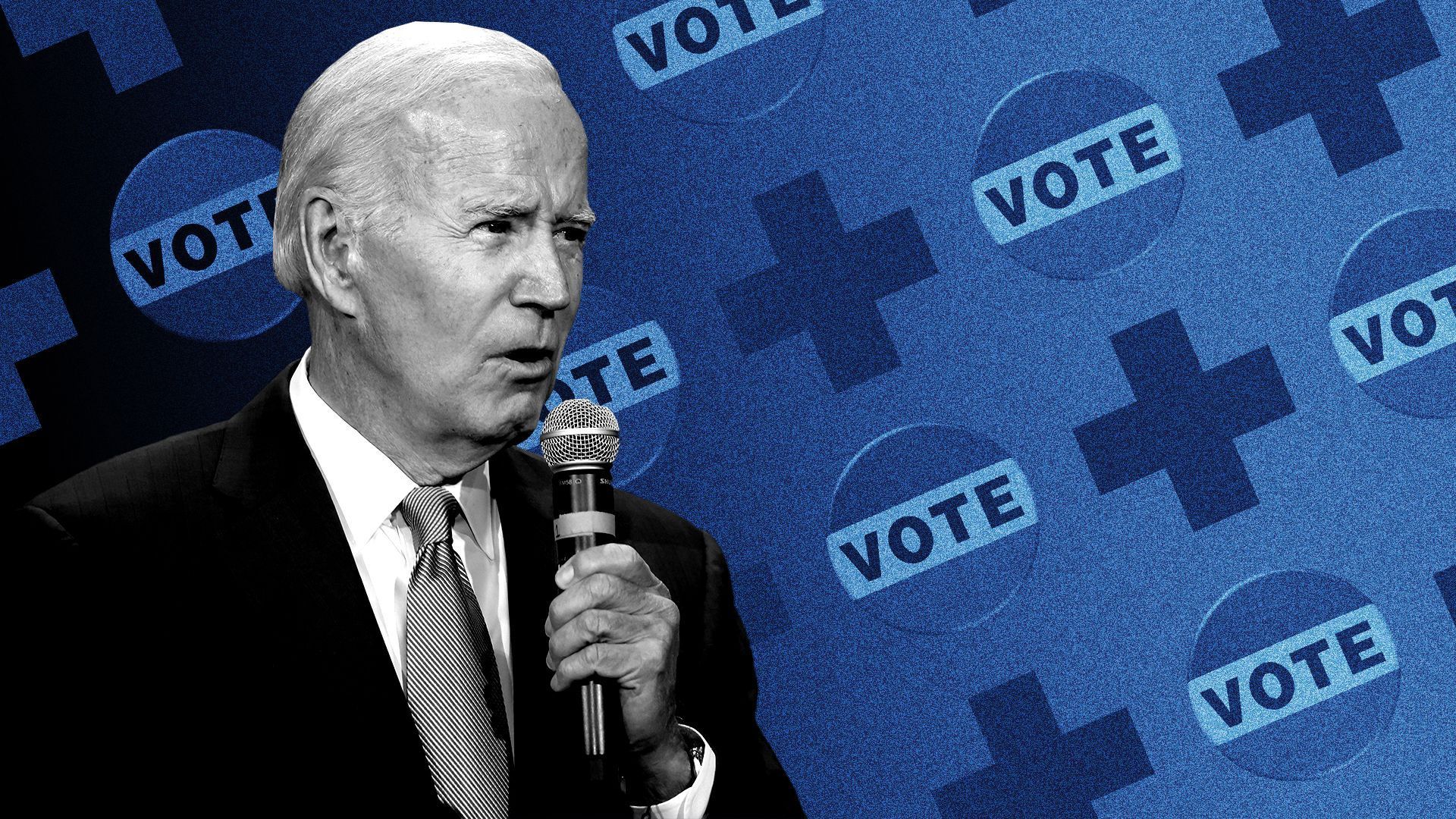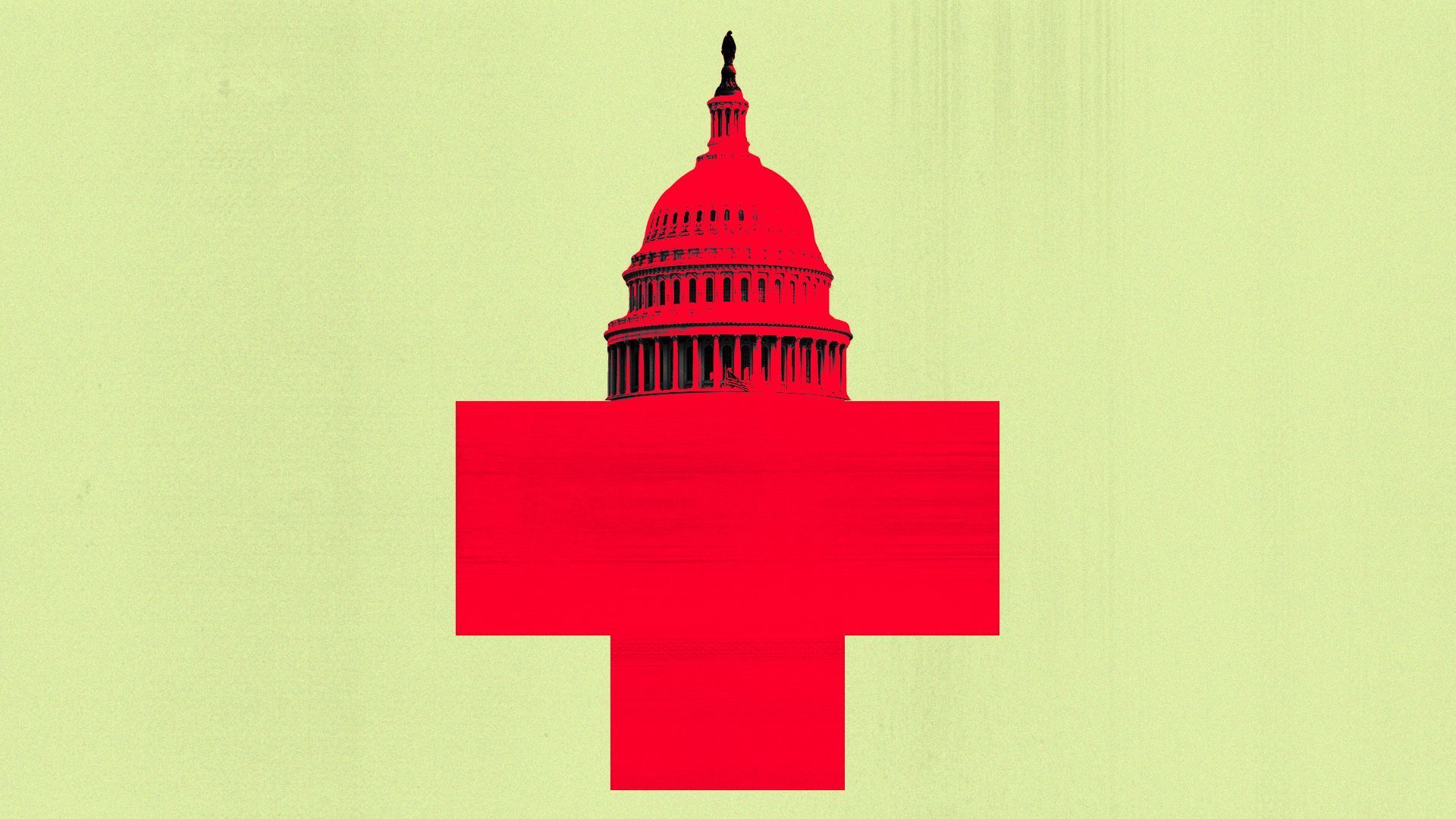| |
| |
| |
| Presented By Optum Rx |
| |
| Axios Vitals |
| By Tina Reed · Apr 26, 2023 |
| Good morning, Vitals readers. Today's newsletter is 1,129 words or a 4½-minute read. 🥱 A case for (short) naps: People who take a siesta or a midday nap longer than 30 minutes are likelier to have a higher body mass index, higher blood pressure and other conditions associated with heart disease and diabetes than non-nappers, a study published in the journal Obesity found. - Some good news? The researchers from Brigham and Women's Hospital found no such consequences from shorter naps.
|
| |
| |
| 1 big thing: The ongoing search for long COVID treatments |
 |
|
| Illustration: Sarah Grillo/Axios |
| |
| As the federal government wrestles with its response to long COVID, FDA officials are turning to patients who've experimented with unproven treatments for clues about how to manage the condition and design clinical trials, Axios' Sabrina Moreno writes. The big picture: More than three years into the pandemic, there's still no standard protocol for diagnosing or treating the neurological issues, cognitive difficulties, breathing problems and other health problems that plague millions of people after they fell ill. - The FDA is hoping "patient-focused drug development" can deliver feedback on drug development and evaluation — an approach it also took to chronic fatigue syndrome, which similarly has no cure.
- Government efforts have so far yielded little for the more than 20 million Americans experiencing ongoing symptoms, with questions particularly swirling around a $1 billion National Institutes of Health effort called RECOVER, as STAT and Muckrock report.
Zoom in: During a six-hour meeting on Tuesday, patients told FDA officials about months-long waits to get into long COVID clinics and efforts to treat symptoms with old drugs and supplements, most of which aren't covered by insurance because of the off-label use. - The list included antidepressants like Lexapro, antibiotics, beta blockers usually used for heart ailments, melatonin for insomnia and vitamin D.
- Other patients reported using Ritalin to help with brain fog, low-dose naltrexone to alleviate inflammation and saline infusions to slow down their heart rates.
What they're saying: One Los Angeles-based patient, Angela Vázquez said she takes 15 different medications to manage mast cell activation, which triggers allergic reaction symptoms, and autoimmune inflammation after getting sick in March 2020. - Tammy Wilshire, who lives in rural Pennsylvania, said it took her nearly two years to find help and has since tried beta blockers for tachycardia, gabapentin and other medications for tremors and fibromyalgia in addition to pain creams and muscle relaxers.
- Daniel, who didn't give his last name, referred to the dozens of medications he's taken as "ridiculous long shots" that haven't significantly improved his condition.
- "We do not have three more years. We will not survive three more years."
Go deeper. |
    |
| |
| |
| 2. CBO: 600,000 more uninsured from House GOP bill |
 |
|
| Illustration: Aïda Amer/Axios |
| |
| About 600,000 people would become uninsured under the House Republican debt bill's plan to impose Medicaid work requirements, the Congressional Budget Office estimated Tuesday, Axios' Peter Sullivan writes. Why it matters: The estimate from Congress' nonpartisan scorekeeper gives a sense of the coverage loss from the proposal, while also highlighting the federal savings. - The federal government would save $109 billion over a decade by making Medicaid recipients work 80 hours a month, CBO estimated.
Between the lines: States would also have to pick up more of the cost for another 900,000 Medicaid enrollees who would lose federal funding for not complying with the work requirement. - Overall, CBO estimates about 15 million people could be subject to the work requirement each year. Opponents warn that even people who comply could end up losing coverage because of burdensome or confusing reporting requirements.
- The work requirement would apply to people ages 19–55 who aren't disabled and don't have dependent children.
The big picture: The bill is not going to pass the Senate, given strong Democratic opposition to work requirements and many other provisions. But it at least could serve to kick off negotiations if House Republicans are able to pass it this week. |
    |
| |
| |
| 3. Biden's re-election bid puts abortion up front |
 |
|
| Photo illustration: Annelise Capossela/Axios. Photo: Anna Moneymaker/Getty Images |
| |
| The Biden administration wasted little time making it clear that abortion access will be a cornerstone of President Biden's 2024 re-election bid as red states continue to enact bans and restrictions, Axios' Oriana González writes. Why it matters: Last year's midterm elections showed voter sentiment breaking for new protections for abortion rights following the fall of Roe v. Wade. Biden is hoping he can replicate that. State of play: Biden's first campaign video released on Tuesday shows footage of abortion rights protests that took place around the time of the Dobbs Supreme Court decision. - Biden referred to "MAGA extremists" who are restricting Americans' rights, including "dictating what health care decisions women can make."
Driving the news: Last night, Vice President Kamala Harris — the White House's top abortion messenger — spoke at a rally at Howard University to highlight the administration's commitment to protect access. What they're saying: Biden's polling numbers aren't consistently strong with all Democratic voters, so abortion can offset some of the lack of enthusiasm, said Joshua Wilson, a political science professor at the University of Denver specializing in abortion politics. Read the rest. |
    |
| |
| |
| A message from Optum Rx |
| Empowering more choice and transparency |
| |
 |
| |
| Optum Rx is offering new payment choices and transparency solutions to the customers we serve. We believe our customers are best positioned to determine the affordability and transparency solutions that best meet their pharmacy benefit needs. Learn more about our pharmacy benefit solutions. |
| |
| |
| 4. Senate health leaders eye PBM reforms |
 |
|
| Photo: Chip Somodevilla/Getty Images |
| |
| Senate health committee leaders served notice on Tuesday that pharmacy benefit managers will be targets of their efforts to rein in drug costs, Peter writes. - Senate HELP Chair Bernie Sanders (I-Vt.) and Ranking Member Bill Cassidy (R-La.) announced a deal on a legislative package ahead of a markup on May 2.
Why it matters: It's not every day you see a bipartisan deal with Sanders and Cassidy, and the legislation is different than what Sanders usually proposes on drug prices. - A new bill from Sanders, Cassidy, and Sens. Patty Murray (D-Wash.) and Roger Marshall (R-Kan.) would impose transparency measures on PBMs, as well as provisions limiting "spread pricing" and ensuring full rebate pass-through to the health plan.
- Other bills would seek to ease the way for competition from generic drugs, including a measure on reforming citizen petitions.
Catch up quick: PBMs are middlemen who negotiate with drug companies on behalf of workplace health plans. - Major players have used spread pricing to keep the difference between what they pay pharmacies and what they charge employers — and also keep part of the rebates.
A version of this story was published first on Axios Pro. Get news like this by subscribing. Use code POLICY100 which gives you $100 off. |
    |
| |
| |
| 5. Bipartisan bill would subject nonprofit hospitals to FTC |
 |
|
| Illustration: Shoshana Gordon/Axios |
| |
| Nonprofit hospitals could be subject to investigations for anticompetitive conduct under a bipartisan House plan first shared with Axios' Arielle Dreher. Why it matters: The nonprofits comprise nearly half of all facilities in the U.S. but fall outside the purview of the Federal Trade Commission. There's been growing concern in Congress over secret contracting practices and other behavior that some lawmakers contend justifies beefing up oversight. The details: The bill from Reps. Victoria Spartz (R-Ind.) and Pramila Jayapal (D-Wash.) would expand antitrust enforcement to non-profit hospitals under the Federal Trade Commission Act, allowing the commission to investigate facilities' anticompetitive behavior. Of note: Non-profits have also come under scrutiny for offering less uncompensated care relative to earnings, as well as for aggressive bill collection practices. - The Biden administration FTC has been more aggressive in challenging health care behavior, particularly hospital mergers.
- The Spartz-Jayapal measure joins a list of reform proposals addressing providers that Congress could take up after debt-ceiling negotiations.
|
    |
| |
| |
| 6. Catch up quick |
| 💉Can Africa get close to vaccine independence? Here's what It will take. (New York Times) 👾 Apple plans AI-powered health coaching service, mood tracker and iPad health app. (Bloomberg) |
    |
| |
| |
| A message from Optum Rx |
| Driving choice, transparency and affordability in pharmacy benefits |
| |
 |
| |
| Optum Rx is working to promote choice and competition to make prescription drugs more affordable. As biosimilars come to market, we're providing flexibility and choice to patients and their providers, while encouraging biosimilar competition to help lower costs. Learn more. |
| |
| Thanks for reading, and thanks to senior health care editor Adriel Bettelheim and senior copy editor Bryan McBournie for the edits. |
 | | Dive deeper into the future of health care | | |
No comments